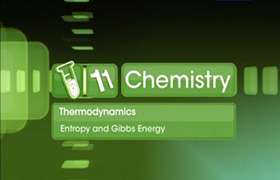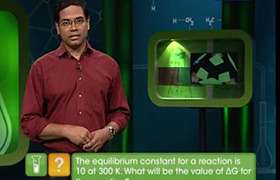CBSE Class 11-science Answered
Please Explain:
Correct answer is option (C)
As for reversible adiabatic process change in entropy is less than zero.
For irreversible adiabatic process the change in entropy is greater than zero.
So option (A) is incorrect as Q → R is reversible process.
option (d) is also incorrect as ΔSPQ
As it should be greater than zero.
In case of option (B) P → R is reversible process. Therefore ΔSPR is not greater than zero.
So it is also incorrect.
Answered by Varsha | 01 Jan, 2018, 04:52: PM
Concept Videos
CBSE 11-science - Chemistry
Asked by mankdubey670 | 06 Jun, 2022, 01:27: PM
CBSE 11-science - Chemistry
Asked by gganga | 10 Apr, 2018, 06:02: PM
CBSE 11-science - Chemistry
Asked by Topperlearning User | 14 Aug, 2014, 04:44: PM
CBSE 11-science - Chemistry
Asked by Topperlearning User | 15 Jun, 2016, 05:46: PM
CBSE 11-science - Chemistry
Asked by Topperlearning User | 14 Aug, 2014, 04:51: PM
CBSE 11-science - Chemistry
Asked by Topperlearning User | 14 Aug, 2014, 04:53: PM
CBSE 11-science - Chemistry
Asked by Topperlearning User | 14 Aug, 2014, 05:00: PM
CBSE 11-science - Chemistry
Asked by Topperlearning User | 15 Jun, 2016, 05:46: PM
CBSE 11-science - Chemistry
Asked by Topperlearning User | 23 Sep, 2014, 03:28: PM
CBSE 11-science - Chemistry
Asked by Topperlearning User | 23 Sep, 2014, 03:39: PM




 ?
? Given that
Given that  for Cu2+(aq) and Zn2+(aq) as 65 kJ mol-1 and -147.2 kJ mol-1 respectively.
for Cu2+(aq) and Zn2+(aq) as 65 kJ mol-1 and -147.2 kJ mol-1 respectively. Calculate the temperature at which Gibbs energy change ΔG is equal to zero. Predict the nature of the reaction at this temperature and above it.
Calculate the temperature at which Gibbs energy change ΔG is equal to zero. Predict the nature of the reaction at this temperature and above it.